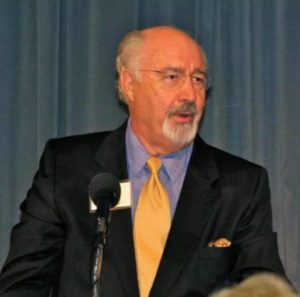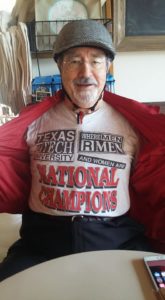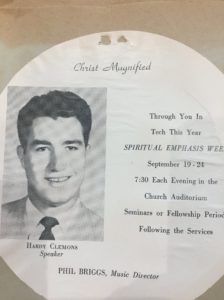Hardy Clemons, one of the most influential and beloved figures in progressive Baptist life, died July 1 in San Antonio, Texas, from COVID-19.

Photo shared on Facebook memorial page by Keith Herron.
Clemons, 87, pastor of three churches in Texas and one in South Carolina, was a denominational leader who shaped churches, institutions and people.
Most people who mourned his passing online seldom mentioned his many vocational accomplishments but instead spoke passionately about his profound influence on a personal level: North star. Guiding light. Lifeboat. Hero. Advocate. Life coach. Encourager.
Clemons was born in Plainview, Texas, in 1933, the only child of Kathleen and H. P. Clemons. He graduated from Texas Tech University in Lubbock in 1955 with a degree in education.
Before leaving Texas Tech for seminary, he married the school’s Baptist student minister, Ardelle Haddock. Although disparate in age, they were married for 57 years until her death in 2011.
At Southwestern Baptist Theological Seminary, in Fort Worth, Texas, Clemons earned bachelor of divinity and doctor of theology degrees. He returned to Texas Tech years later to convert the Th.D. to a doctor of philosophy degree, focusing his study on the link between psychology and theology.
That doctorate symbolized his ministry — always a pastor but simultaneously a highly skilled counselor.
Dozens of Baptist ministers credit Clemons as their mentor in ministry.
Not only did he counsel his parishioners, but dozens of Baptist ministers credit Clemons as their mentor in ministry. For decades he was deeply committed to cultivating a new generation of pastors who were both competent in pastoral leadership and healthy in mind and spirit.
“I think of him as a North Star, one by whom you can always get your bearings in life and in ministry,” said Frank Granger, minister of Christian community at First Baptist Church in Athens, Ga.
“His network was vast, and he was a hero to many, a source of great wisdom and counsel,” said Tim Willis, a friend and longtime campus minister at Clemson University near Greenville. “During a dark stretch, he was my life coach. His legacy will be carried forth by the men and women whose lives he forever impacted. He was one of a kind, a treasure that keeps on giving.“

Photo shared on Facebook memorial page by Jim Kersey.
Clemons’ book on grief, Saying Hello to Your Life After Grief, is a treasured resource for many ministers and laypeople.
“Hardy Clemons was the light. The trustworthy. The courageous. And the humble,” recalled Amanda Hiley, one of those deeply impacted by Clemons’ guidance and advocacy. When she shared her gratitude with him a couple years ago, “he wept,” she said. “He couldn’t imagine how his small actions meant so much 25 years later.”
A similar story of gratitude is told by Phil Christopher, pastor of First Baptist Church in Abilene, Texas. “The truth is, I don’t know what kind of pastor I would be today without Hardy Clemons,” he said.
“Today as I have looked at his picture that hangs in my study, I remembered he married Mary and me, he preached my ordination service, he dedicated our son, Jeremy, he preached the installation sermon of blessing when I came to Abilene 25 years ago. Mary’s dad was on the search committee that called him to Second Baptist. I also had the privilege of officiating at the wedding of his daughter, Kay and son-in-law Tim Watts. Hardy wanted to be just a dad and not the pastor that day, which says so much about him.
“He was my mentor and spiritual father. When I graduated from Southern Seminary, Second Baptist called me as youth pastor. Working as a colleague with Hardy was like an extension of my theological education. Hardy modeled for me authenticity as a minister. He taught me to be real and human. He didn’t teach me to use ‘God-talk’ as a young minister but the language of grace, vulnerability and a gospel of reconciliation.
“The truth is, I don’t know what kind of pastor I would be today without Hardy Clemons.”
“He impacted my life and ministry so much that after I left Second Baptist my friends would observe how I had taken on Hardy’s mannerisms and speech patterns,” Christopher confessed. “Perhaps the greatest compliment is trying to imitate someone. But Hardy always affirmed my gifts and encouraged me to be who I am and the ways God works though our earthen clay pots.”
Clemons was an unmistakable presence, a 6-foot-2 teddy bear with a booming yet soothing voice. He was quick to laugh, self-deprecating, always affirming.

Photo shared on Facebook memorial page by Cindy McBrayer.
He was pastor of First Baptist Church of Georgetown, Texas, from 1961 until 1967, when he and Ardelle moved back to Lubbock. There Clemons served Second Baptist Church as pastor for 21 years, leading the young church to become an outspoken progressive influence in the dominantly conservative state.
“I had no idea how unusual it was to be in a place that stridently supported women as ministers and leaders — both clergy and laity — until we moved away from Lubbock and visited countless other churches,” recalled Christie Goodman of San Antonio, Texas, who was a member of Second Baptist during Clemons’ tenure. “Hardy did not sit back and wait for people’s gifts to be revealed. He created opportunities for exploration and growth.”
In 1988, he moved east to become pastor at First Baptist Church in Greenville, S.C., for the next 12 years. Under his leadership, the congregation was one of the first Baptist congregations to “demonstrate abundant inclusivity,” recalled Karl Thomas, a college student and church member at that time.
“His fingerprints remain all over the church, the community, Furman University, the Cooperative Baptist Fellowship, and almost every other Baptist entity that emerged during that season,” said Jim Dant, current pastor of the Greenville church.
“And yet, it was his unstructured, personal, warm style that everyone remembers and loves. And Hardy’s fingerprints are not the kind that people want to wipe away. In Greenville, we smile and are warmed every time we see them, every time a memory is evoked.”
Three years after moving to Greenville, when moderate and progressive Baptists withdrew from the Southern Baptist Convention, Clemons played a key role in forming the alternative Cooperative Baptist Fellowship. He served as the Fellowship’s third national moderator, the highest elected leadership post, in 1993-94.
He was a gifted pastor to congregations and one of the most highly respected leaders in our Fellowship and the larger Baptist family.
When Clemons took the one-year volunteer CBF position, veteran journalist Jack Harwell called him “one of the most free and open Baptists you will ever hope to meet. He believes in freedom with responsibility, unity in diversity, in team approach to ministry, in theological integrity, in indigenous missions, and in the full right and responsibility of laypeople — male and female alike — to interpret the Scriptures and serve God.”
“He was a gifted pastor to congregations and one of the most highly respected leaders in our Fellowship and the larger Baptist family,” said Paul Baxley, CBF executive coordinator.
“Hardy was a steadfast supporter of women in ministry,” said Suzii Paynter, Baxley’s predecessor at CBF. “Hardy helped me and so many others match our gifts with our ministry opportunities. His love, candid conversation, sense of humor and wisdom made me fit for ministry at every stage.”
When he retired in 2000, the Clemonses moved back to Texas to reunite with their daughter, Kay, and her family in San Antonio. He continued to lend his wisdom to ministers and churches across the South and Southwest and served as interim pastor of Hendricks Avenue Baptist Church in Jacksonville, Fla.
But Clemons returned to pastoral ministry in 2005 to become executive pastor of Trinity Baptist Church in San Antonio, joining senior pastor Charles Foster Johnson, his successor at Second Baptist in Lubbock.
He retired again in August 2008 yet continued to preach, write and mentor young ministers.
He served on the board of directors for Furman University for many years. He co-chaired the Religious Liberty Council of the Baptist Joint Committee for Religious Liberty. He is a recipient of the Wayne Oates Lifetime Achievement Award for Pastoral Care and Counseling, given annually by the Wayne E. Oates Institute.
Clemons’ pastoral manner surfaced in every conversation, friends say, and it was always the same — encouraging, affirming, blessing.
“I was ever in awe of his wisdom in human relationships,” said Baptist historian Bill Leonard of Wake Forest University, (and it was) communicated with that folksy warmth that carried you into confessing stuff to him. Been there, done that.”
Whether he heard a confession, a frustration, a complaint, most often his response was one ambiguous word, spoken without judgment or guile: “Well … .”
“It was the word I heard him say more than any other single word in over four decades of deep friendship,” said Baptist historian Buddy Shurden. “He said it the same way every time, but inexplicably it fit every possible situation.
Whether he heard a confession, a frustration, a complaint, most often his response was one ambiguous word, spoken without judgment or guile: “Well … .”
“Hardy was one of the most non-anxious people I ever met,” said Johnson, now pastor of Bread Fellowship of Fort Worth and executive director of Pastors for Children. “He had a way of listening endlessly and absorbing anxiety into that enormous, loving presence of his. I would rail on passionately to Hardy, his attention focused on every word. Finally, I would take a breath for Hardy to give his response, only to hear him say one syllable, in that long west Texas drawl: ‘Well?’”
Clemons suffered from dementia in recent years and resided in an assisted living facility when he contracted COVID-19, said daughter Kay Clemons Watt.
“As we talked to the people at (the facility), they said over and over, ‘We don’t know what it is about him, but he has helped so many of our staff members. It was really beautiful that, despite advanced stages of dementia, he was still touching people.”
A memorial page has been established on Facebook, where friends have been posting tributes and memories. No public funeral is planned, but a private memorial service will be held at the family lake house. The service will be live-streamed for the public on the Facebook memorial page Friday, July 10, at 10:30 a.m. Central Time.
In lieu of flowers, the family asks that contributions be made to the Ardelle and Hardy Clemons Endowment Fund at Baptist News Global, for which Ardelle was a founding board member.
